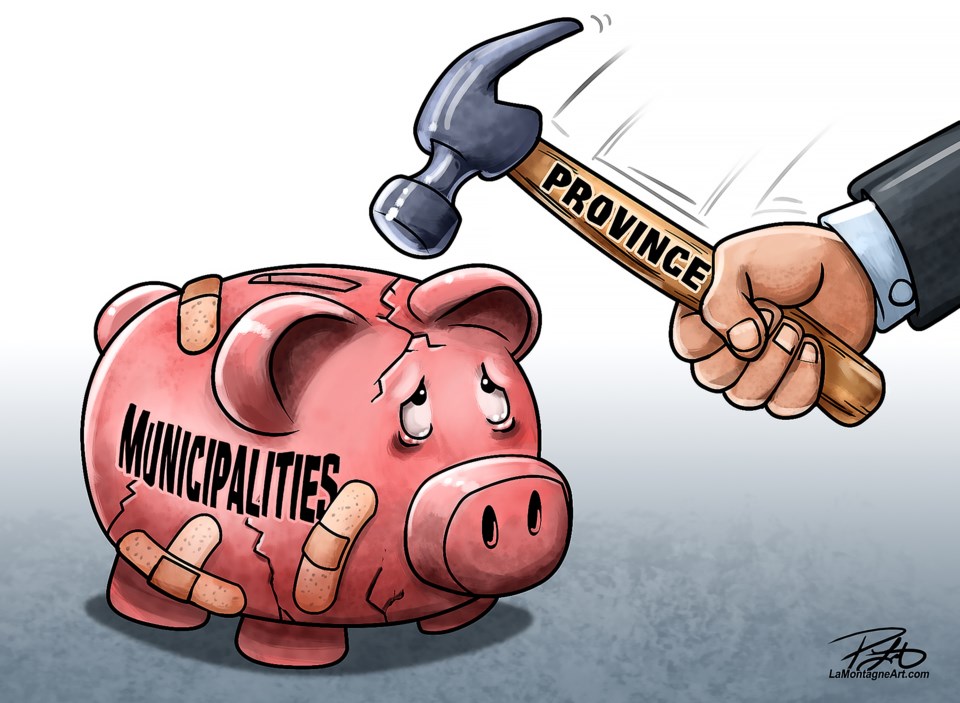Downloading can mean something different to everyone.
For most, it’s saving a file from the internet where the greatest issue is connection speeds.
For municipalities, the word is enough to send shivers down the spine of elected officials and bureaucrats.
Provincial governments across Canada have been steadily offloading costs to local governments in an effort to make their own annual budgets and deficits more amiable to citizens. However, it comes at a cost as the bills for services still need to be paid by someone.
That someone? Local taxpayers.
Though some may say there’s only one taxpayer, that can depend on the level of services continued to be offered and the price municipalities are willing to accept.
Downloading can come in many forms. It can simply be a halt of funding and leaving it to a municipality to decide if they keep wanting to pick up the tab. It can also come through new legislative requirements, scaling back of infrastructure grants and an increase in services outside a municipalities control.
When the Alberta government made the decision to stop increasing funding for select social services, it didn’t mean inflationary costs stopped at the same time.
It left municipalities with the difficult decision of finding money to maintain services or choosing to not fund the difference and see some social services impacted.
The most well-known is the ongoing ambulance crisis that frequently has paramedics from rural and smaller communities responding to the significant increase of calls in major cities such as Edmonton and Calgary.
Alberta Health Services has made efforts to minimize the impact on smaller communities – with several pilot projects aiming to help – but the pressure has seen a growing number of medical calls be responded to by firefighting departments heavily reliant on part-time staff.
It means additional staff time, resources and equipment costs are being picked up by municipal taxpayers as opposed to the intended provincial coffers.
The proposed plan of an Alberta provincial police force to replace the RCMP has raised additional red flags for municipalities who have growing concerns any plan would see added financial crunch for municipal taxpayers.
The extra costs is different from one municipality to the next as some may choose to see social services slowly erode and others not so much. Fire and medical calls continue to be answered as an essential service and those bills keep piling up.
Alberta Municipalities – the advocacy organization for municipal governments to the provincial and federal governments – have been banging down the door to raise awareness with little success.
In Ontario, the Ford government ironically targeted public health in the lead-up to the COVID-19 pandemic and put more pressure on municipalities to make up the difference. The decision has wrecked many municipal budgets for years to come to the tune of hundreds of millions.
A 2014 report from The Tyee found in British Columbia from 1995 to 2008 there were roughly $4 billion in transfers from the federal and provincial governments to municipalities that evaporated.
At the local level, some municipalities have chosen to keep track or even bill the province – with full knowledge that it’ll never get paid – when they have to take over provincial duties.
The towns of Gibbons and Okotoks have some form of recording, while the Town of Canmore will begin keeping track and attempt to find the financial impact.
A municipality is the creation of the province, so provincial governments can choose how much or little it actually listens or pays attention to the lower tier of governance.
If the mess of downloading is going to be fixed, it’s going to need provincial governments and the federal government willing to come to the table and work on solutions.
It may be a broader look at the funding model, providing longer term grants or focusing on the impact the cuts have on taxpayers.
Though these are difficult and arduous questions to answer, it’s clear the existing model and reliance on downloading aren’t working.




